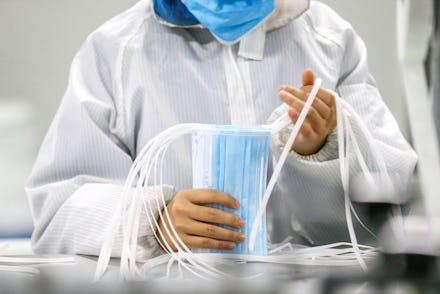The doctor who tried to warn the world about coronavirus has died from the illness

Li Wenliang, a 34-year-old doctor in Wuhan, China, was one of the first people to warn others about a SARS-like illness, now known as coronavirus, spreading among his patients. He sent a private message to his friends online. Then, his warning was posted to the internet for all to see. Wuhan police, who saw the posts that kept Dr. Li's name intact, reportedly moved to silence him. If he did not stop spreading "rumors," the BBC quoted, he would be "brought to justice."
The doctor agreed to stay silent and continue his usual work. He eventually contracted the disease from one of his patients and fell ill. According to the BBC, there were then conflicting reports from state media about whether he is in critical condition or dead.
The BBC spoke with anonymous journalists and doctors at the scene, who explained that Dr. Li's death was first announced by Chinese state media. The news created an outpouring of reactions from Chinese citizens on social media, many of whom were outraged by his censorship and his death. Shortly after, the "[official] media outlets were told to change their reports to say the doctor was still being treated." The doctor was apparently then given a treatment, called ECMO, to keep his heart and blood pumping.
"He is currently in critical condition and we are trying our best to resuscitate him," the Wuhan Central Hospital, where Dr. Li was hospitalized, wrote on its official Weibo account.
Later, The New York Times reports, the hospital confirmed on Weibo that Dr. Li had passed.
The confusion behind the doctor's condition was yet another red mark against the Chinese government's handling of the situation. Reporters and analysts have described a system that continues to censor critics — which can include health professionals like Dr. Li — and hide information that could have prevented or slowed the spread of the virus among citizens. And Dr. Li wasn't the only one who tried to raise a warning flag; according to the BBC, he was one of eight people who police questioned and silenced for spreading "rumors."
It's an enormous disappointment to Chinese citizens who thought the government learned its lesson after the SARS outbreak in 2003.
Xu Zhiyuan, a talk show host and critic of the government during the SARS epidemic, expressed his dismay on social media. "The system is successful in that it destroyed the people with integrity, the institutions with credibility, and a society capable of narrating its own stories," quoted The New York Times. "What's left is an arrogant power; a bunch of messy information; and many fragile, isolated, and angry individuals.
"I thought SARS would force China to rethink its governance model," he continued. "I was too naïve."
Late Monday, China's top leadership admitted, in a moment reporters have called "rare," that there were "shortcomings and difficulties" in the country's response to the coronavirus. The police even sent an apology to Dr. Li after the outbreak was revealed. But such admissions and apologies have come too late for some people. The number of deaths from the coronavirus has reached 563. The number of infected people has risen to 28,018. And critics have accused China of continuing to lowball the numbers to keep up appearances.
Covering up the situation has arguably already cost lives — possibly including Dr. Li's. After he was instructed to stay silent, he returned to work at the hospital. During the first few weeks of the outbreak, which began in January, government officials insisted the illness could only be contracted from infected animals. No one offered the doctors any guidance on taking extra protective measures when treating patients with coronavirus.
On Jan. 10, Dr. Li wrote on social media that he felt horribly sick. Within three days, he was in the hospital. He was tested several times for the virus, but all the results came back negative. On Jan. 31, he was finally tested as positive for the coronavirus. It was the last post he made before he went silent.